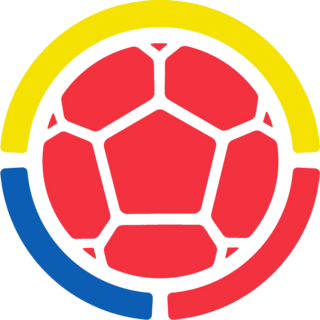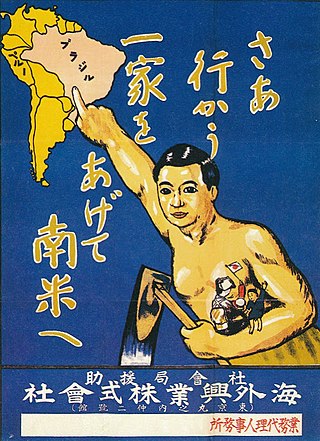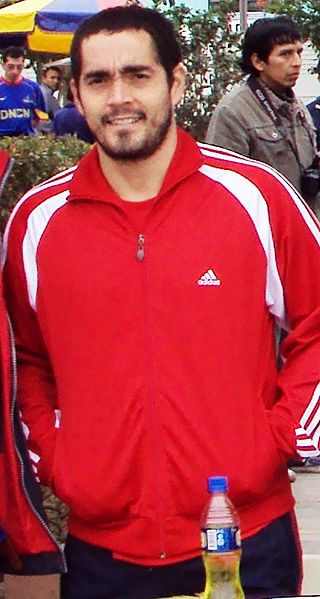
Basketball at the 1936 Summer Olympics was the first appearance of the sport of basketball as an official Olympic medal event. The tournament was played between 7 August and 14 August 1936 in Berlin, Germany. 23 nations entered the competition, making basketball the largest tournament of the team sports, but Hungary and Spain withdrew, meaning 21 competed.

The Colombia national football team represents Colombia in men's international football and is managed by the Colombian Football Federation, the governing body for football in Colombia. They are a member of CONMEBOL and are currently ranked 14th in the FIFA World Rankings. The team are nicknamed Los Cafeteros due to the coffee production in their country. The national team has been a symbol of nationalism, pride and passion for many Colombians worldwide. Colombia is known for having a passionate fan base, and the team's dances during goal celebrations have been symbolic.

The Peru national football team represents Peru in men's international football. The national team has been organised, since 1927, by the Peruvian Football Federation (FPF). The FPF constitutes one of the ten members of FIFA's South American Football Confederation (CONMEBOL). Peru has won the Copa América twice, and has qualified for the FIFA World Cup five times ; the team also participated in the 1936 Olympic football competition and has reached the semi-finals of the CONCACAF Gold Cup. The team plays most of its home matches at the Estadio Nacional in Lima, the country's capital.

The Venezuela national football team represents Venezuela in men's international football and is controlled by the Venezuelan Football Federation (FVF), the governing body for football in Venezuela. They are nicknamed La Vinotinto. When playing at home in official games, they usually rotate between three stadiums: The Polideportivo Cachamay in Puerto Ordaz, the Estadio José Antonio Anzoátegui in Puerto La Cruz and the Estadio Pueblo Nuevo in San Cristóbal. In friendly matches, they tend to rotate between the rest of the stadiums in the country.
Asian Latin Americans are Latin Americans of Asian descent. Asian immigrants to Latin America have largely been from East Asia or West Asia. Historically, Asians in Latin America have a centuries-long history in the region, starting with Filipinos in the 16th century. The peak of Asian immigration occurred in the 19th and 20th centuries. There are currently more than four million Asian Latin Americans, nearly 1% of Latin America's population. Chinese, Japanese, and Lebanese are the largest Asian ancestries; other major ethnic groups include Filipinos, Syrians, Indians, and Koreans. Brazil is home to the largest population of East Asian descent, estimated at 2.08 million. The country is also home to a large percentage of West Asian descendants. With as much as 5% of their population having some degree of Chinese ancestry, Peru and Mexico have the highest ratio of any country for East Asian descent. Though the most recent official census, which relied on self-identification, gave a much lower percentage.
The Kirin Cup Soccer is an association football tournament organised in Japan by the Kirin Brewery Company. The host, Japan, is a participant in every edition. The tournament was founded in 1978 then known as Japan Cup, and was last held in its full form in 2022.

Japanese Peruvians are Peruvian citizens of Japanese origin or ancestry.
Football at the 1936 Summer Olympics was won by Italy. After the introduction of the first FIFA World Cup in 1930, competing nations would from now on only be permitted to play their best players if those players were amateur or where professional players were state-sponsored. However, since amateur players were counted as senior squad players, their results would be still counted as senior side's results until 1992.
Japanese football in 2007
Japanese football in 2005

Marko Gustavo Ciurlizza Rodríguez is a Peruvian retired footballer who played as a defensive midfielder.
Jair Edson Céspedes Zegarra is a Peruvian footballer who plays for Deportivo Binacional in the Torneo Descentralizado.
Jorge Hirano Matsumoto is a former Japanese Peruvian football player.
José Pereda, also known as "El Chino" for his Japanese origin is a retired Peruvian footballer.

The Peru national football team has represented Peru in international football since 1927. Their first match came against Uruguay at the 1927 South American Championship. As of September 2019, Peru has played 645 matches with 212 wins, 157 draws, and 276 losses.
Japanese football in 1999
The Japan national football team in 2011, managed by head coach Alberto Zaccheroni, began by competing and winning the 2011 AFC Asian Cup. The win meant Japan were crowned the Champions of Asia for a record 4th time and earned a berth in the 2013 FIFA Confederations Cup. The team would continue by competing in the 2011 Kirin Cup and the 2011 Copa América in amongst other international friendly matches before closing out 2011 by commencing in the third round of the 2014 FIFA World Cup qualification as they progress towards the 2014 FIFA World Cup.

Asociación Academia de Cultura Japonesa is a Japanese international school in Surco, Lima, Peru. It is under the Asociación Academia de Cultura Japonesa, which has the same Spanish name but a different Japanese name. It serves elementary and junior high school levels.

This article provides details of international football games played by the Japan national football team from 2020 to present.
This article provides details of international football games played by the Peru national football team from 2020 to present.
This page is based on this
Wikipedia article Text is available under the
CC BY-SA 4.0 license; additional terms may apply.
Images, videos and audio are available under their respective licenses.








